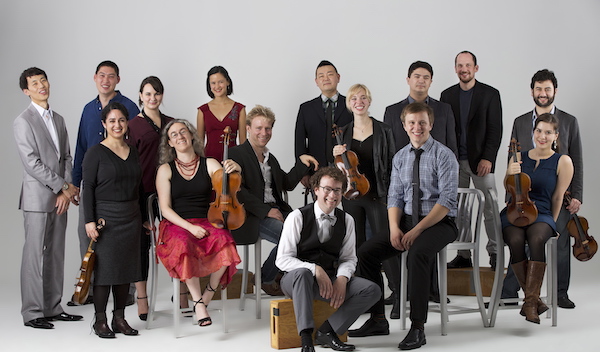Concert/Stream Review: A Far Cry’s “Emergence” — Typically Eclectic
By Jonathan Blumhofer
The Criers’ program pairs three composers one doesn’t always find together. As is likewise the norm with this group and their selections, everything somehow connects — and on multiple levels.

The chamber orchestra A Far Cry.
Not many unqualified good things have yet emerged out of the Covid pandemic. However, one small positive of these last months, at least as far as the performing arts are concerned, is the growing option of live- and on-demand streaming concert content. While necessarily unable to replicate the experience of in-person performance, one can, at the very least, sometimes catch up on some otherwise missed opportunities.
Such was my experience with the chamber orchestra A Far Cry’s Emergence program, which was originally presented live on November 5 at New England Conservatory’s Jordan Hall. It’s now available to stream on the ensemble’s website through December 19.
The Criers’ program in it is typically eclectic, pairing three composers one doesn’t always find together: Lei Liang, Benjamin Britten, and Leoš Janáček. As is likewise the norm with this group and their selections, everything somehow connects — and on multiple levels.
Liang’s Verge is the concert’s breathtaking opener. Written around the time of the birth of the composer’s son, Albert, in 2009, the piece is at once a tribute to the newborn — there’s a heartbeat motive as well as a melodic line based on a musical transcription of his name — as well as a fascinating study in contemporary string techniques.
To be sure, there’s nothing easy or, on the surface, sweet about the demands Liang makes on his forces here. Rhythmic schemes are complex, harmonies dense. He explores a huge range of sonorities, from fragile, glassy textures to pungent cluster chords.
Yet there’s a wonderfully strong sense of shape and direction to the larger piece. Its structure boasts a Mozartian clarity. What’s more, many of the gestures Liang draws on beguile. The most conspicuous of these is a shimmering glissando figure that seems to evoke shooting stars.
The Criers’ performance, bracingly fresh and tightly focused, captures all of this, as well as the touching lyricism of Verge’s recurring keening theme.
They do more of the same in Zenas Hsu’s arrangement of Britten’s 1942 String Quartet no. 1. Though Britten’s score hails from a more familiar place, formally and harmonically, it shares more than a few commonalities with Verge. There is, for instance, a similar attention on musical space as well as contrasts of tone. This is perhaps most evident in the big first movement, with its floating, airy refrain that alternates with a vigorous, punching Allegro.
The Criers play it all with purpose. That opening movement — well directed, smartly balanced, texturally lucid — fits the larger ensemble impressively well. So do the slashing, dancing second and the gorgeous third, with its beautiful melodic lines and serene coda.
In the short finale, Hsu makes clever use of the big group, passing its dialoguing figure around the orchestra with unpredictable panache.
No such reorganization was necessary for Janáček’s 1877 Suite for Strings. Its six short movements evoke, to varying degrees, Grieg and Dvorak — but they regularly go their own, gloriously unpredictable way, too.
Here, the Criers boldly draw out the first movement’s divergences of snapping and lyrical characters. The second, pure-toned and iridescent, benefits from the group’s flexible phrasings.
Meanwhile, the bumptious third movement comes across with genial charm; the outer sections of the fourth drive as stormily as its central Andante glows.
In the fifth, hushed ensemble intensity frames some fervent cello solos while the finale’s tempestuous melodic lines surge.
In addition to the performance, the on-demand stream includes spoken introductions from Liang and Hsu discussing and (in the latter case) demonstrating their efforts. Sound quality is largely excellent and natural (a few relatively quiet episodes of microphone static notwithstanding), as is the videography.
A Far Cry’s Emergence is available to stream now through December 19. The group’s next performance, Flames to Ashes, features music by Yan Lancaster, Kevin Puts, and Jungyoon Wie, at 4 p.m. on December 18 at St. John’s Episcopal Church in Jamaica Plain.
Jonathan Blumhofer is a composer and violist who has been active in the greater Boston area since 2004. His music has received numerous awards and been performed by various ensembles, including the American Composers Orchestra, Kiev Philharmonic, Camerata Chicago, Xanthos Ensemble, and Juventas New Music Group. Since receiving his doctorate from Boston University in 2010, Jon has taught at Clark University, Worcester Polytechnic Institute, and online for the University of Phoenix, in addition to writing music criticism for the Worcester Telegram & Gazette.
Tagged: A Far Cry, Benjamin Britten, Emergence, Lei Liang

Such a pleasure to discover and read this review, of a concert I’ve just streamed for a third time — something I like to do for unfamiliar music, and can do with my subscriber’s month of streaming. On a day of freezing rain in Maine, the fire and joy of A Far Cry, and then the pleasure of reading someone else’s response, both warm and astute. Thank you!